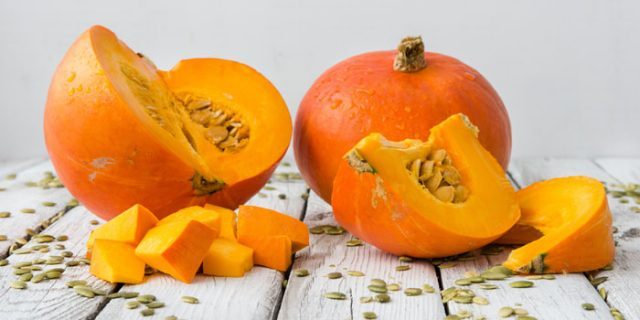Pumpkins are part of the squash family and they are usually large, round and vibrant orange with a slightly ribbed, tough and smooth outer skin. Inside the pumpkin are the seeds and flesh. Pumpkin is a great source of potassium and beta-carotene, which is a carotenoid that converts to vitamin A. It also contains some minerals including calcium and magnesium, as well as vitamins E, C and some B vitamins. 80g of pumpkin (roughly 3 heaped tablespoons, diced and cooked) counts as one portion of your five-a-day. Take a look at our printable infographic to discover what counts as 5-a-day.
Pumpkin contains vitamins C and E, as well as beta-carotene, all of which have been found to play an important role in the health of our skin.
Vitamin C is not naturally made by the body and so it is important we get it from the diet every day, as it plays a part in collagen formation, helps to prevent bruising and helps with wound healing.
Vitamin E is an excellent antioxidant and acts together with vitamin C, helping to protect against sun damage and prevent dryness of the skin. Vitamin A, or beta-carotene, is also involved in skin protection from the sun’s UVB rays and may help protect against sunburn, although sunscreen is still required!
A deficiency of vitamin A has been linked with reduced vision or even blindness. Beta-carotene, as well as vitamins C and E, can help protect eyes and reduce the risk of age-related eye diseases.
Metabolic syndrome is the medical name for a combination of diabetes, obesity and high blood pressure which collectively then increases your risk of coronary heart disease and stroke.
A 2015 study in Japan found that diets high in carotenoids, which are pigments found in fruit and vegetables that give them their orange, yellow and green colours, may help prevent the development of metabolic syndrome.
As indicated by their bright orange colour, pumpkins contain beta-carotene, which is converted to vitamin A when consumed. Research has demonstrated that vitamin A plays an important role in supporting the immune system, of which around 80% is in the digestive system. Further research suggests that diet, including vitamin A, has a direct effect on immune system function.
While there are no single ‘superfoods’ that can prevent cancer and certain risk factors for cancer are unrelated to diet, there is evidence that eating a healthy diet can reduce the risk of cancer. There is some evidence to suggest that the antioxidant properties of carotenoids, vitamin A and vitamin E, all of which are found in pumpkin, may protect against breast cancer.












